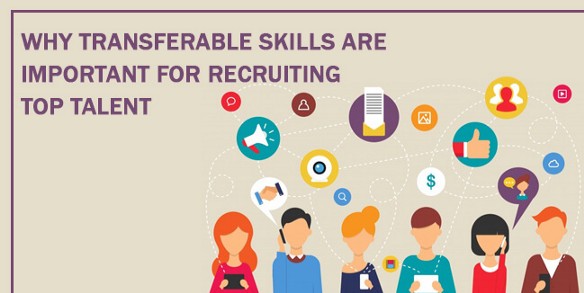The majority of recruiters, when hiring new employees, often look for direct and relevant experience. Undoubtedly, hiring people with vast expertise in a particular area can increase your chances of getting a skilled employee who can be productive from day one. However, when you focus only on people with direct experience, you’re missing on a large pool of talent. What’s more, you’re sticking with people who are happy to keep doing the same job and are not motivated or ambitious enough to learn new skills.
That’s why more experienced recruiters often consider potential candidates with transferable skills. Although recruiting people with transferable soft skills can be expensive and time-consuming, it can be a more effective and profitable decision in the long run.
Here’s everything you should know about how to attract talent who possesses transferable skills and the benefits these people can bring to the table.
What are transferable skills?
Transferable skills definition may vary but in general, they are the skills employees take with them from one experience to another. Their relationship with other people often characterizes them. These are the skills that they master over the years and can apply in different situations, projects, or work environments.
Although there are probably hundreds of examples of transferable skills, I’ve narrowed the transferable skills list down to a few core skills that most recruiters should look for in a candidate:
- Teamwork: people who possess teamwork skills can empathize with their co-workers and work effectively alongside them. Teams that are made up of people with great teamwork skills are more productive and engaged in their work.
- Communication: employees with good verbal and written communication skills can understand and deliver information quickly and accurately. These people can present their ideas properly, speak appropriately with a wide variety of people, listen effectively, and work well in a group.
- Dependability: according to CareerBuilder, 73% of hiring managers look for candidates with a strong work ethic. People with a strong work ethic possess great dependability skills that include punctuality, organization, and responsibility. They accomplish their tasks well and on time.
- Self-motivation: self-motivated people require less supervision and oversight than other workers. They take initiative, get tasks done without any reminders, and are independent.
- Problem-solving and critical thinking: Adobe conducted a survey in which it discovered the need for schools to transform their teaching programs. According to the study, 97% of educators surveyed believed that students should learn creative problem-solving skills, while 74% thought that these skills would be essential for the age of automation. People who possess good problem-solving skills can look at a problem and come up with a viable solution.
What are the benefits of transferable skills?
Hiring a candidate with a strong set of transferable skills over one with vast experience comes with multiple benefits for the company.
People with transferable soft skills can bring diversity to your team.
There’s a belief that diversity improves company reputation, inspires innovation, and increases profits. There’s also evidence to support this belief. Bersin by Deloitte 2015 High-Impact Talent Management research found that diverse companies are 1.8 times more likely to be prepared for change. Moreover, they’re 1.7 times more likely to be innovation leaders in their industry. If your current team already has great employees who possess hard skills, having a person with transferable soft skills join the team can diversify the workplace.
You’ll experience lower turnover rates.
If you allow your new employees to grow and thrive in a new way, they’ll be more engaged and motivated in their work. They’ll have higher chances of staying with your company for a longer time, saving your business energy and turnover costs.
Your team will come up with new approaches to problems.
Experimental studies report that teams with diverse members can come up with more unique and useful ideas. Your team will be able to think of new approaches to problems, create smarter ideas, and get the job done faster.
Tips for attracting talent with transferable skills
Craft your job descriptions wisely.
You want to attract a remarkable and brilliant person who has never set foot in your industry before. If you want to get their attention, craft your job descriptions wisely. You want to emphasize that your company is looking for a candidate with transferable soft skills from outside your industry. It’s crucial that you mention that training is involved in the onboarding process. You want to attract these candidates by outlining all the benefits and growth opportunities they’ll get by joining your company.
Remove the experience requirement during recruitment.
Your recruitment efforts to lure the candidate to the company will be futile unless you drop the “industry experience” requirement. Your recruitment process will be faster and easier if the candidate knows that you’re after their transferable soft skills and not their expertise in a specific industry.
Organize training sessions.
Let’s assume that you’re in the tech industry. In order for the non-tech newcomer to learn what your business is about, you’ll need to offer proper training. This will be their chance to attend meetings, ask questions, and get a feel of your business. Training period length will depend on the nature of your business and the candidate’s ability to progress.
Make interviews more interesting.
If you’re making an effort to modernize your recruitment process, your company is already more attractive. Unlike others, you are valuing soft skills along with hard skills. Many candidates will recognize how you stand out from the crowd. So why not make the interviews more interesting as well? Don’t make it too formal! Try to learn a great deal about the candidate, talk about their career, and let them ask questions. A tour around the company is another smart idea. This will be their chance to meet the team and feel like a part of the company.
Create an amazing Career page on your website.
Your Career page is where potential employees go to research and see whether it has what they’re looking for. Make sure your page presents your company in the best light. Generic photos, outdated content, and monotone job listings are a major turnoff. By crafting a unique and informative Career page, you’ll reduce your complicated way of recruiting candidates with transferable skills. Make sure your Career page content says how your job requirements are not limited to the “industry experience” factor. It should be visible that you’re looking for talented individuals with great transferable soft skills, regardless of their years of experience in a specific industry.
Sell your company.
If you want the most exceptional talent to come and work for you then you have to sell your company to them. Take the time to work on your elevator pitch to potential employees ahead of time and come to the interview prepared. For example, if a candidate tells you that their current employer doesn’t offer maternity leave, emphasize how your company is willing to offer them those type of benefits. Every little detail will stimulate the candidate to see themselves working at your company.
Employee referral program.
An employee referral program is a super effective tool for hiring and retaining exceptional employees. By setting up a referral program, your current employees can become your best recruiters. Do you have an employee who knows a person with great transferable skills? Great! Invite them over for an interview! By doing so, you’ll significantly improve your time and quality of hire.
Final Word
With technological advancement in every sector, the future of work is likely to introduce a wide range of new jobs. And what kind of skills these jobs might require? Experts predict that the most important skills in the coming decades will be soft skills. Problem-solving, communication, and teamwork will be essential skills in the workforce of the future.
So, why not get ahead of other companies and start hiring people who possess the right transferable skills? With the right approach to recruiting and assessing a candidate’s abilities, you might discover that hiring outside of your industry is a win-win.









